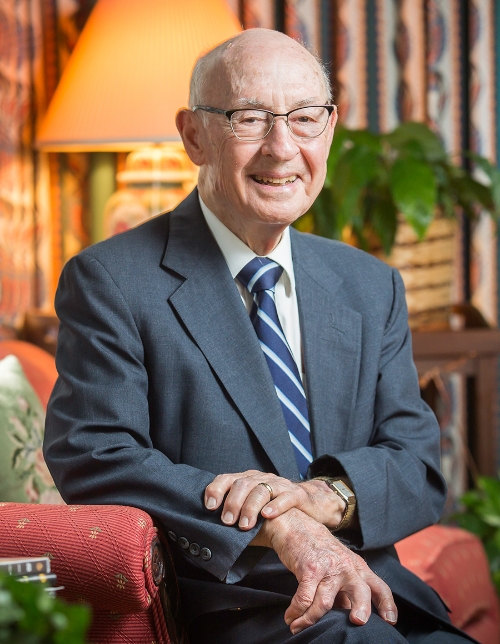“I can’t stand to be idle. I’m interested in people and I like to be involved with people. I’ve always got something going on.”
— LOUIS CURET
By Sara Bongiorni
Photo by Tim Mueller
Louis D. Curet retired nine years ago after 55 years as an estate attorney in Baton Rouge, but you wouldn’t know it from the pace he keeps in his 87th year on this planet.
Driven by a no-nonsense conviction that the world must get better each day, he raises funds for nonprofits and is a champion of causes.
Since 1952, he’s been in charge of selling tickets to the Kiwanis pancake breakfast at LSU’s Pete Maravich Assembly Center.
Mary Bird Perkins Cancer Center has acquired millions of dollars in life-saving medical equipment with his help. And Curet has assisted in raising millions for the French program at LSU, where he graduated in 1947.
Civic awards in his name reflect more than half a century of volunteer leadership for the region’s educational, cultural and medical bulwarks.
Read our story about Louis Curet in the fourth quarter 2014 issue of Currents.
Read our story about Louis Curet in the fourth quarter 2014 issue of Currents.
His ties to the Baton Rouge Area Foundation run deep. He was president of the Baton Rouge Bar Association in the early ’70s, a role that gave him a spot on the Foundation board of directors at the time.
There is no downtime for Curet, a resident of the Garden District most of his life. He works out each day at the gym, sharpens his French at weekly classes and began traveling the world in his early 70s, taking summer trips 13 years in a row to France, Italy and other European countries.
On weekends, he often drives to his New Roads home, Bonnie Glen, where he regularly hosts fundraisers or opens the house to tours. He is matter-of-fact about a lifetime of community involvement.
“I can’t stand to be idle,” Curet says. “I’m interested in people and I like to be involved with people. I’ve always got something going on.”
Curet’s father, A.B. Curet, was county agricultural agent for Pointe Coupee Parish. His mother, Rose Gosserand Curet, taught school and insisted Louis study piano and elocution.
He is named for a favorite uncle, Louis H. Gosserand, who was a powerful influence. Mr. Gosserand wrote speeches for his nephew, including one on the Great Depression that Curet delivered at the Pointe Coupee Parish Fair. He was 5 years old.
“I talked about the economy,” he recalls.
There was never any question he would be a lawyer. Curet had hoped to go into practice with his uncle Louis, who practiced law in New Orleans but spent weekends in New Roads. Gosserand died in 1948, two years before Curet received his law degree from LSU’s Paul M. Hebert Law Center.
In 1950, Curet went into practice with criminal defense attorney Sam D’Amico. Their law office was small but well respected, with an informal influence that reached beyond the official caseload of their Third Street location: D’Amico and Curet functioned as an unofficial proving ground for many fledging attorneys fresh out of law school.
Curet speaks with a distinct clipped, whimsical accent. He describes it as Creole—a remnant of his childhood in Pointe Coupee, when he often heard Creole French.
His gaze is both intense and friendly. He has a cut-to-the chase directness softened by impeccable manners and an understated charm.
Curet is a student of history—he is member-chairman of the Supreme Court of Louisiana Historical Society and owns every LSU Gumbo yearbook since 1938. Yet he is also enthusiastic about change in Baton Rouge, including the evolution of its downtown skyline and the anticipated arrival of an IBM software development center.
He used to ride bikes with his daughter around City Park Lake, and he is thrilled about plans to revive the lakes around LSU.
His charm includes exacting standards for honesty and dress code. Attorney Henry Bernard has firsthand experience with those standards in both areas.
Bernard recalls working through a succession as a young lawyer in Curet’s office and coming up about a nickel off in his calculations. Bernard volunteered to pitch the difference in the sum into the kitty to account for his imperfect calculation, a suggestion Curet summarily rejected.
“He wanted me to do it again so everything came out even,” says Bernard.
Later, Bernard and his wife went to Curet’s home for what he had been told was a “very casual” gathering. Curet opened the door to greet the couple wearing a buttoned-up black suit and a tie.
The next time Bernard was invited to the Curets’ home for a casual gathering he showed up in his best clothes to sit in the backyard and eat crawfish alongside Curet, who on this occasion wore a sport jacket.
“Louis never had an idea of how to be casual,” Bernard says. “I’ve never seen him in tennis shoes or jeans.”
Charm only partly explains what makes Curet a formidable fundraiser. Friends say he is also deeply but quietly competitive, with a bulldog determination to hold tight to what matters to him.
“He gets hold of something and he does not let loose,” says financier Dudley Coates, a friend and former tennis partner. “He is always polite, but he also wants to get his way because he believes in what he wants to do.”
A pair of yellow boxing gloves that hangs from the back of a chair in the dining room of Curet’s home suggests another comparison.

